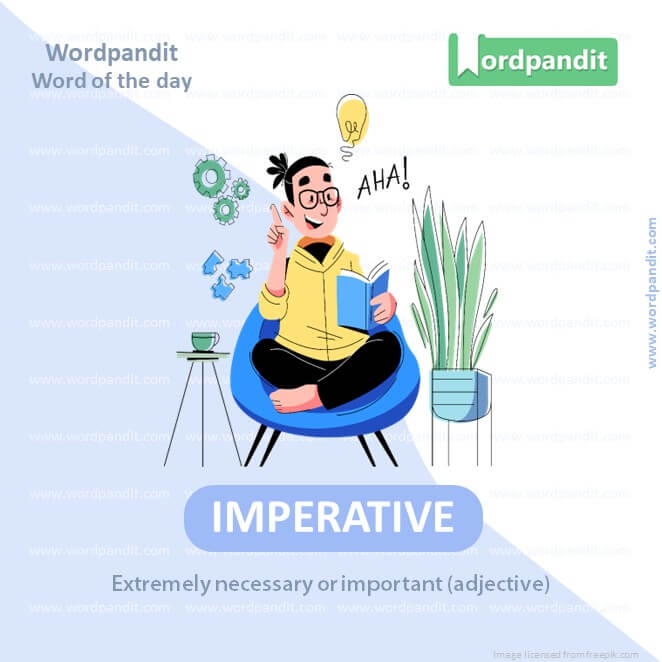Daily Vocabulary Words: List of Daily Used Words in Leading Indian Newspapers
Hi there. Welcome to this special section @ Wordpandit. Our endeavour here is straightforward: highlighting daily vocabulary words that you would come across in leading newspapers in the country. We have included the following newspapers in our selection:
• The Times of India
• The Economic Times
• Hindustan Times
• Mint
• Indian Express
We are putting in extensive work to develop your vocabulary. All you have to do is be regular with this section and check out this post daily. This is your repository of commonly used words; essentially, we are posting a list of daily used words. Hence, this has significant practical application as it teaches you words that are commonly used in leading publications mentioned above.
Visit the website daily to learn words from leading Indian newspapers.

WORD-1: DECOLONISE
CONTEXT: “Decolonis!” This imperative seems to be the idealogical flavour of the moment. It is behind the calls to restructure education, to rewrite laws, reconceptualise history, reimagine public spaces, reclaim public consciousness, and even junk the Constitution.
SOURCE: The Indian Express
EXPLANATORY PARAGRAPH: Imagine you have a toy and someone takes it away from you. After some time, they give it back. “Decolonise” is like giving back the toy. It’s when people take back control of their land or country after someone else had control for a long time.
MEANING: To free a country from being controlled by another (verb).
PRONUNCIATION: Dee-koh-loh-nize
SYNONYMS: Liberate, Free, Emancipate, Release, Disenthrall, Unshackle, Unyoke
USAGE EXAMPLES:
1. The country wanted to decolonise and be free from foreign rule.
2. The process to decolonise the nation took many years.
3. The leaders worked hard to decolonise their land.
4. The history books talk about the efforts to decolonise many countries.

WORD-2: IMPERATIVE
CONTEXT: “Decolonis!” This imperative seems to be the idealogical flavour of the moment. It is behind the calls to restructure education, to rewrite laws, reconceptualise history, reimagine public spaces, reclaim public consciousness, and even junk the Constitution.
SOURCE: The Indian Express
EXPLANATORY PARAGRAPH: “Imperative” is a fancy word that means something is really, really important and needs to be done right away. Like when your mom says it’s imperative to brush your teeth before bed.
MEANING: Extremely necessary or important (adjective).
PRONUNCIATION: Im-peh-ra-tiv
SYNONYMS: Crucial, Vital, Essential, Critical, Urgent, Necessary
USAGE EXAMPLES:
1. It’s imperative to wear a helmet when riding a bike.
2. Drinking water is imperative for our health.
3. The teacher said it was imperative to finish the homework.
4. It’s imperative to listen to safety rules.

WORD-3: CONCERTED
CONTEXT: Over the last few years, the Parliament of India has made concerted efforts to introduce information technology in the functioning of the Parliament and its secretariat in order to connect better with members, other legislative bodies and the citizens.
SOURCE: The Indian Express
EXPLANATORY PARAGRAPH: Imagine you and your friends are building a big sandcastle. Everyone is working together, helping each other, and doing their best. That’s what “concerted” means – when everyone works together to do something.
MEANING: Done together by multiple people or groups (adjective).
PRONUNCIATION: Con-sur-ted
SYNONYMS: Combined, Joint, United, Cooperative, Collective, Coordinated, Unified
USAGE EXAMPLES:
1. The family made a concerted effort to clean the house.
2. It was a concerted decision to go on a vacation.
3. The team’s concerted efforts led to their victory.
4. A concerted approach is often more effective.

WORD-4: BORNE
CONTEXT: A large unified domestic market with an increasing investment appetite, favourable demographics as the rest of the world ages, and reforms borne out of conviction, have come together to bolster the econony in an otherwise gloomy global environment.
SOURCE: The Hindustan Times
EXPLANATORY PARAGRAPH: “Borne” is a word that means carried or moved by something. Like when a leaf is borne by the wind and it floats in the air.
MEANING: Carried or transported by something (verb).
PRONUNCIATION: Born
SYNONYMS: Carried, Transported, Conveyed, Delivered, Moved, Shifted, Relocated
USAGE EXAMPLES:
1. The message was borne by the messenger to the king.
2. The seeds were borne by the wind across the field.
3. The boat was borne downstream by the current.
4. The news was quickly borne throughout the village.

WORD-5: DEMOGRAPHIC
CONTEXT: A large unified domestic market with an increasing investment appetite, favourable demographics as the rest of the world ages, and reforms borne out of conviction, have come together to bolster the econony in an otherwise gloomy global environment.
SOURCE: The Hindustan Times
EXPLANATORY PARAGRAPH: “Demographic” is like a group of people who have something in common. Maybe they are all kids, or all grown-ups, or all live in the same place. It’s a way to talk about a certain group of people.
MEANING: A specific group of people within a population (noun).
PRONUNCIATION: Dem-oh-graph-ic
SYNONYMS: Group, Segment, Population, Category, Class, Sector, Division
USAGE EXAMPLES:
1. The toy company targeted a young demographic with their new product.
2. The survey focused on the demographic of teenagers.
3. The show is popular among the older demographic.
4. Advertisers often study demographics to decide where to put their ads.
WORD-6: CONVICTION
CONTEXT: A large unified domestic market with an increasing investment appetite, favourable demographics as the rest of the world ages, and reforms borne out of conviction, have come together to bolster the econony in an otherwise gloomy global environment.
SOURCE: The Hindustan Times
EXPLANATORY PARAGRAPH: Imagine you believe in something so strongly, like knowing that the sky is blue. No one can tell you otherwise because you’re sure of it. That strong belief is called “conviction.”
MEANING: A strong belief or opinion (noun).
PRONUNCIATION: Con-vik-shun
SYNONYMS: Belief, Certainty, Confidence, Assurance, Faith, Certitude, Sureness
USAGE EXAMPLES:
1. She spoke with conviction about saving the environment.
2. His conviction in his own abilities made him successful.
3. Despite doubts, she held onto her conviction.
4. It’s important to have conviction in one’s values.
WORD-7: GLOOMY
CONTEXT: A large unified domestic market with an increasing investment appetite, favourable demographics as the rest of the world ages, and reforms borne out of conviction, have come together to bolster the econony in an otherwise gloomy global environment.
SOURCE: The Hindustan Times
EXPLANATORY PARAGRAPH: “Gloomy” is when things feel dark, sad, or not very happy. Like when the sky is full of dark clouds and it looks like it’s going to rain, or when you feel a bit sad inside.
MEANING: Dark or dim; feeling or looking sad or dismal (adjective).
PRONUNCIATION: Gloom-ee
SYNONYMS: Dark, Dismal, Dreary, Sad, Depressed, Downcast, Bleak
USAGE EXAMPLES:
1. The room was gloomy without any lights on.
2. He felt gloomy after hearing the sad news.
3. The weather was cold and gloomy.
4. The old house had a gloomy appearance.
WORD-8: PARLANCE
CONTEXT: Relegated to what Simone de Beauvoir called the Second Sex, with males by implication occupying the No 1 place, women in everyday parlance were, and still are, referred to as ‘babes’, irrespective of age, or ‘chicks’, or ‘dolls’, children of a lesser deity than the one who created Adam in his own image.
SOURCE: The Times of India
EXPLANATORY PARAGRAPH: “Parlance” is a fancy word for the way people talk or the words they use. Like, in computer parlance, a “mouse” isn’t an animal; it’s something you use to click on things on the screen!
MEANING: A particular way of speaking or using words, especially a way common to those with a particular job or interest (noun).
PRONUNCIATION: Par-lans
SYNONYMS: Language, Jargon, Slang, Terminology, Vocabulary, Dialect, Speech
USAGE EXAMPLES:
1. In medical parlance, a “scalpel” is a small sharp knife used by doctors.
2. “LOL” is common parlance in text messaging.
3. In legal parlance, “plaintiff” means the person who starts a lawsuit.
4. The term “byte” is often used in computer parlance.
WORD-9: DEITY
CONTEXT: Relegated to what Simone de Beauvoir called the Second Sex, with males by implication occupying the No 1 place, women in everyday parlance were, and still are, referred to as ‘babes’, irrespective of age, or ‘chicks’, or ‘dolls’, children of a lesser deity than the one who created Adam in his own image.
SOURCE: The Times of India
EXPLANATORY PARAGRAPH: A “deity” is like a god or goddess. Some people believe in them and think they have special powers. Like in stories, where a deity might control the sun, the rain, or the wind.
MEANING: A god or goddess (noun).
PRONUNCIATION: Day-uh-tee
SYNONYMS: God, Goddess, Divinity, Immortal, Supreme Being, Idol, Celestial
USAGE EXAMPLES:
1. In ancient Greece, Zeus was considered a powerful deity.
2. Many cultures have deities that they worship and pray to.
3. The deity of love is often depicted with a bow and arrow.
4. Temples are often built to honor a particular deity.
WORD-10: PATRIARCHY
CONTEXT: When Indira Gandhi became the nation’s first woman prime minister, Indian patriarchy in the form of the Syndicate within Congress dismissively termed her a ‘gungi gudiya’, a literally dumb doll, who’d have no say in running the country.
SOURCE: The Times of India
EXPLANATORY PARAGRAPH: Imagine a family where the grandpa or the dad makes all the big decisions and is seen as the main leader. “Patriarchy” is a word that describes a system where men have more power and control than women. It’s like saying, in this system, men are like the captains of the team.
MEANING: A system of society or government in which men hold the power and women are largely excluded from it (noun).
PRONUNCIATION: Pay-tree-ark-ee
SYNONYMS: Male dominance, Androcracy, Father-rule, Man’s world, Male-led society, Masculine authority, Male supremacy
USAGE EXAMPLES:
1. Many ancient societies were based on patriarchy.
2. The movement aimed to challenge the existing patriarchy.
3. In a patriarchy, women often have fewer rights and opportunities.
4. Some stories highlight the effects of patriarchy on individuals and communities.
Vocabulary Daily Use
Bringing fluency to one’s language usage necessitates the regular incorporation of a broad range of words. Central to this is the understanding of vocabulary daily use. But, how should one effectively learn and employ this vocabulary daily use? Here are some proven methods to enhance your language proficiency.
Understanding vocabulary is only half the job; incorporating these vocabulary daily use words effectively in conversations is equally crucial. Be it social or professional, the acquired words should be part of your everyday language. Regular communication using these vocabulary daily use words can help etch them more firmly into your language repertoire.
Reading materials like newspapers, articles, and books expose you to vocabulary daily use in their natural context. Seeing the vocabulary daily use words in sentences presents a clearer picture of its correct usage. Another excellent option is to watch movies or listen to songs in the targeted language– a fun, effective way to take in vocabulary daily use.
Maintaining a personal dictionary or a word diary can prove helpful. Note the freshly learned vocabulary daily use words, their meanings, and a sentence to understand its usage. Revising these words regularly will reinforce their meanings and usage, accelerating your language acquisition.
App reflection is also a handy tool for learning vocabulary daily use. Language apps often come equipped with daily word challenges and usage examples. Regular practice on these platforms can help seamlessly blend these vocabulary daily use words into your linguistic framework.
Finally, having consistent conversations with peers or language learning communities can be beneficial. These discussions challenge you to better utilize vocabulary daily use, thereby making them an integral part of your active speaking vocabulary.
In conclusion, absorbing vocabulary daily use into your linguistic reservoir involves active application, avid reading, word diary upkeep, usage of language apps, and regular usage in conversations. Combining these techniques guarantees a fruitful journey towards learning vocabulary daily use.













